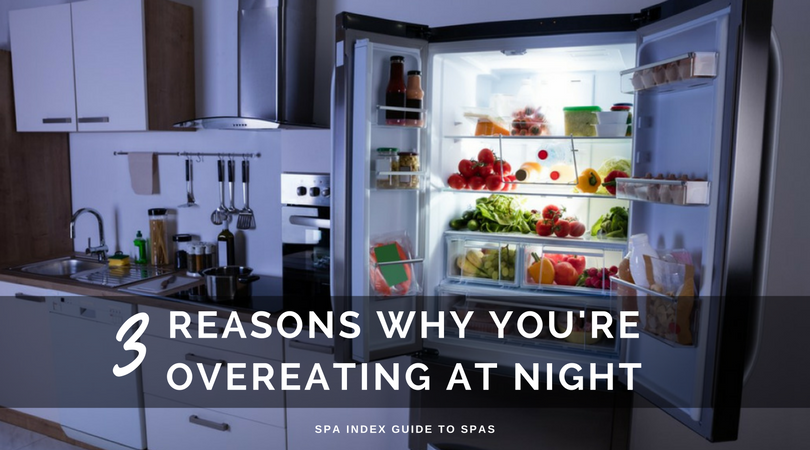3 Reasons You Keep Overeating at Night

If there’s one thing that seems to plague many of us, it’s the munchies to eat at night. Even after eating dinner, many of us find ourselves peering into the refrigerator each night, searching for something to satisfy.
Is it physical hunger that’s calling? Or emotional soothing that food is sometimes so good at providing?
Marsha Hudnall, MS, RDN, CD, President & Co-Owner of Green Mountain at Fox Run, a health and weight loss retreat for women in Vermont, shares her insight about why we keep overeating at night.
TOP REASONS FOR OVEREATING AT NIGHT
1. Physical Hunger
2. Emotional Hunger
3. Spiritual Hunger
1. YOU'RE PHYSICALLY HUNGRY
Physical hunger occurs when your body needs food. It’s the growling stomach, the empty feeling, even the crankiness that tells you it’s time to eat.
The pressures of today’s world, however, leave little time for meals during our busy days. That means we often end the day on empty, and even a balanced dinner doesn’t adequately fill our tanks. We may walk away from the table feeling satisfied but find ourselves back in the kitchen just an hour later searching for something to eat.
Likewise, if we’re weight worriers, we often skip meals or eat too little at meals and find ourselves in the same boat when nighttime arrives.
The solution: Make eating well a priority.
That means eating when you are hungry. Most of us get hungry every 3 to 5 hours or so. Start with breakfast; skipping breakfast is clearly linked to night eating. You don’t have to eat immediately upon arising, though. If you’re not hungry, just try to eat within a couple hours.
Also remember to get plenty of fluid — whether it be water or foods that contain a lot of water such as fruits, vegetables and soups.
If you’re not sure when you’re hungry, try eating on a schedule for a while. Your body will adjust and start telling you clearly that it’s time to eat.
You may like three meals, or you may like smaller, more frequent meals and snacks. Whatever works for you is fine. But do balance your day, including vegetables/fruits, protein foods and grains/starchy veggies throughout the day. That gives your body the nutrients it needs to produce the hormones that manage hunger throughout the day — and night.
Also, if your schedule keeps you up late, it’s normal to get hungry again after dinner. When you’re awake, your metabolism is working at a higher rate than when you’re sleeping. Remember the 3-5 hour guideline.
You also want to make sure you get plenty of sleep – 7-8 hours on average for most. Lack of sleep can throw appetite hormones off, making you feel like eating more than you really need.
2. YOU'RE EMOTIONALLY HUNGRY
Emotional hunger occurs when your emotional needs aren’t fulfilled. There can be a variety of reasons for that — everything from spending too much time taking care of everything but yourself, to traumatic experiences that leave you feeling anxious, fearful… and more.
Stress is a common culprit of emotional night eating. Suffering from chronic stress day in and day out results in the body consistently acting through our sympathetic nervous system response (fight, flight, freeze). When we eat, our digestive system releases chemicals to lower stress and aid in digestion (the parasympathetic response).
Because of this parasympathetic response in our bodies as a result of eating, we often turn to food to give us that stress release – if only momentarily.
The solution: Put you at the top of your to-do list.
By front loading self-care (such as going to bed earlier if you tend to run short on sleep, or take soaking baths to relax at night), you’ll be better able to manage stress and accomplish all the other things you want and need to do. If a past traumatic experience has left lingering effects, work with a therapist to determine how best to manage that.
Remember, eating is a wonderful way to help ourselves feel better in the moment — it’s one of the greatest pleasures of life! In fact, eating emotionally sometimes is completely normal. But if it’s your only way to cope, that’s when it can create more problems that it solves.
To help decide of your eating is supportive or unsupportive, we recommend asking yourself the 3 “How’s”:
1. How often am I eating?
2. How much food am I eating?
3. How else am I coping with my emotions/stress?
3. YOU'RE SPIRITUALLY HUNGRY
Spiritual hunger isn’t about religion, although it can be that for some people. For others, it’s about a lack of connection, a sense of belonging to a community, and often just about having pleasure in our lives.
Often, women who struggle with weight isolate themselves because of worry about how they look. Unfortunately that creates a vicious cycle: isolation leads to secrets, secrets lead to shame, and shame leads back to isolation.
The solution: Practice Body NeutralityTM & self-compassion, and ask for the support you need.
To begin, try reading our body neutrality tips to overcome negative body image – if you isolate because of worry about how you look, this will help you to develop a healthier relationship with yourself and others.
Then, practice self-compassion. Self-compassion leads to healthy behaviors, which leads to self-respect. Self-respect will help you to find and request the support you need, which is essential. Our infographic on how to support women who struggle with weight can help educate friends and loved-ones about how to better support you.
At the end of this process, you may even feel comfortable enough to make new, safe connections with others who understand you.
Explore your reasons for eating at night by starting in the order they are listed above. It’s important to rule out physical hunger first because if you are physically hungry, you need to eat! And when you do, tune in and savor. That helps you feel satisfied with the amount that is right for your body.
ABOUT GREEN MOUNTAIN AT FOX RUN
Exclusively for women of all backgrounds, shapes and sizes, Green Mountain at Fox Run (GMFR) in Vermont is a healthy living retreat that teaches how to live healthfully and happily, free of feelings of restriction and deprivation often associated with dieting and the thin ideal. As the nation’s oldest retreat exclusively for women who struggle with weight, emotional and binge eating, and feelings of food addiction, the team has spent over four decades developing and refining a practical, pioneering non-diet strategies that have helped thousands of women end the yo-yo cycle of weight loss and regain. You’ll work with our caring and experienced team that includes nationally renowned experts in the fields of behavioral and emotional health, eating behavior and nutrition, fitness and movement. We are pioneers, innovators and thought leaders in our field, offering the only program of its kind in the country.
Marsha Hudnall, MS, RDN, CD, President & Co-Owner of Green Mountain at Fox Run, a health and weight loss retreat for women in Vermont, shares her insight about why we keep overeating at night.
Marsha has been a part of Green Mountain since 1986, where her mission has been to help participants learn to enjoy food and eating while successfully managing their weight and health. In addition to overseeing a professional program that helps women establish sustainable approaches to healthy living, she is a thought leader when it comes to managing eating, emotions and weight. She has been a voice of reason for the last three decades in helping people move away from diets. This is an area in which she is personally as well as professionally versed. She successfully overcame an eating disorder brought on by dieting.


